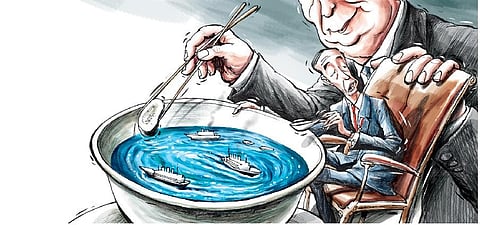China’s tensions with Indonesia in North Natuna Sea
By the end of December 2021, the stand-off between Indonesia and China over their respective claims to the waters around the Natuna region became more strident. This is an area of contested claims from the Chinese side that violates the United Nations Convention on the Law of the Seas (UNCLOS); Beijing claims roughly 80% of the maritime spaces in the South China Sea. For Jakarta, the regions extending north of the Natuna island fall under its Exclusive Economic Zone (EEZ), which is rightfully recognised by the UNCLOS as Indonesian waters, where the country can carry out exploration of resources. Over the past few months, tensions between Indonesia and China in the territorial waters of this region were clear, as Jakarta has been liaising with international companies to explore its EEZ for resources. Indonesia’s responses have been complex as it has tried to balance its sovereign rights and its economic relations with its bigger neighbour.
The tensions over the region of the Natuna sea became visible nearly a decade ago, after China began to assert its claims to the nine-dash line. As China began to officially state its claims over the South China Sea, the Indonesian Ministry of Foreign Affairs in November 2015 asked for a clarification on the waters of the Natuna Sea. The Chinese foreign ministry spokesperson’s response stated that Beijing did not have any claims to the Natuna island, leaving the region of Indonesia’s EEZ extending from the island in a state of diplomatic uncertainty and ambiguity. However, Indonesia has repeatedly focused on the importance of UNCLOS and the relevance of adherence to international law as a means of resolving the maritime disputes in the region. In 2015, as part of its response, Indonesia also clearly reiterated that it did not recognise the nine-dash line and that it did not even consider itself a claimant in the South China Sea dispute as it had no claims over the Spratly and Paracel group of islands, which was the core area of contestation. In a defiant stand, Indonesia in 2017 began to identify the region around the Natuna island as the north Natuna Sea.
The more recent tensions exacerbated when the proposal for a joint consortium between two international oil companies went through after findings of a moderate amount of natural gas to the tune of 600 billion cubic feet, of which 45% is in the condensate form that can be marketed, as stated by an article in the Asia Times. The two companies, Harbour Energy and the Russian state-owned enterprise Zarubezhneft have announced this after a successful completion of the evaluation of the regional resources. The two companies have been clear that the appraisals for the exploration have been successfully concluded in the Tuna block, a region within the Indonesian EEZ that is very close to its maritime border with Vietnam. The discovery of nearly 100 million barrels of oil in the region, as reported in Energy Voice, indicates the reasons for the growing presence of Chinese vessels in the region and automatically heightens geopolitical tensions.
Around late August, a Chinese survey vessel and two coast guard boats entered into the Indonesian EEZ, ratcheting up geopolitical tensions between the two countries. This was the first such stand-off in the region around the Tuna block, where the Chinese vessel was mapping the seabed for resources and began to object to the exploration activities by Indonesia. In September, the AUKUS deal went through between the US, UK and Australia, which saw some minor diplomatic stresses between China and Indonesia. This was because the Chinese foreign ministry summoned the Indonesian ambassador and expressed its concerns over the AUKUS deal, pushing Jakarta firmly into a tight corner on the US-China rivalry issue. Given that the nation is neither a member of the AUKUS, nor a party to the South China Sea dispute, this diplomatic pressure by China was clearly misdirected as Jakarta had no leverage on how regional states of ASEAN would respond to the AUKUS. Recently, Defence Minister Prabowo Subianto responded that while AUKUS raised regional concerns of an arms race, it was understandable and needs to be respected.
Indonesia’s response to the incursions have been somewhat muted, which several analysts say is due to the deepening of economic ties between the nation and China. Beijing has become one of the largest investors in infrastructure development in Indonesia, particularly funding the Jakarta-Bandung High Speed Railway Link. This was initially being funded by the Japanese International Cooperation Agency (JICA), but the project went through several ups and downs, including a cancellation of the proposed railway, finally tipping the balance in favour of China. Beijing has funded $4.5 billion for the railway link, the total cost of which is valued at $8 billion. Indonesia has had to actually resort to using its state budget to address the increase in costs for the project, which has led to concerns. Moreover, China plays a crucial role in the areas of nickel smelting and the production of lithium batteries in Indonesia, leading to an increased economic role. This has led to a more complex diplomatic manoeuvrability for Jakarta, where its bebas dan aktif or free and active foreign policy is tethered on increasing close ties to China, putting Indonesia in a difficult place vis-a-vis its regional leadership role.
Shankari Sundararaman
Professor at School of International Studies, JNU, New Delhi
(shankari@mail.jnu.ac.in)

